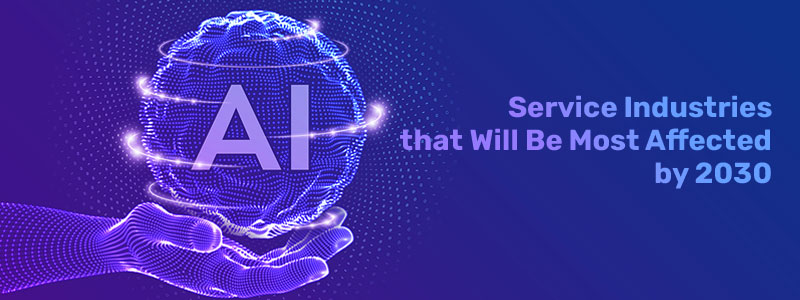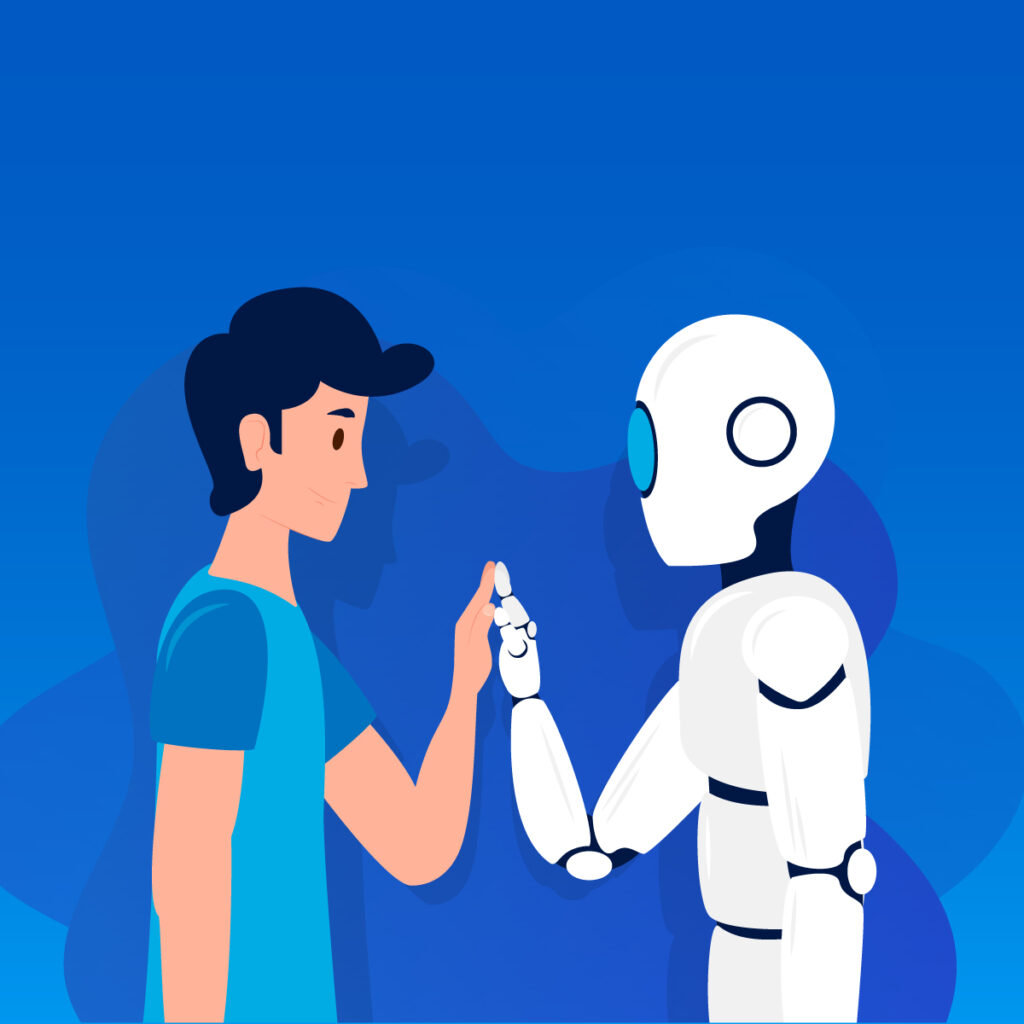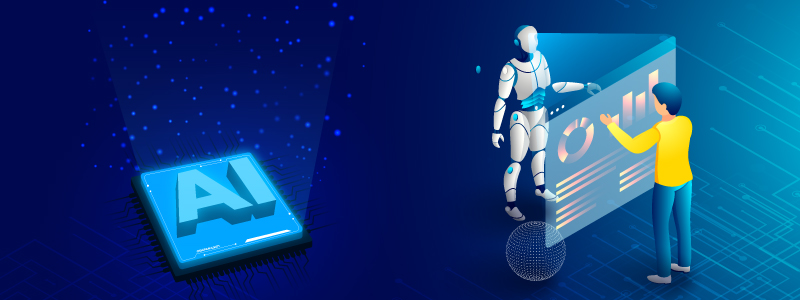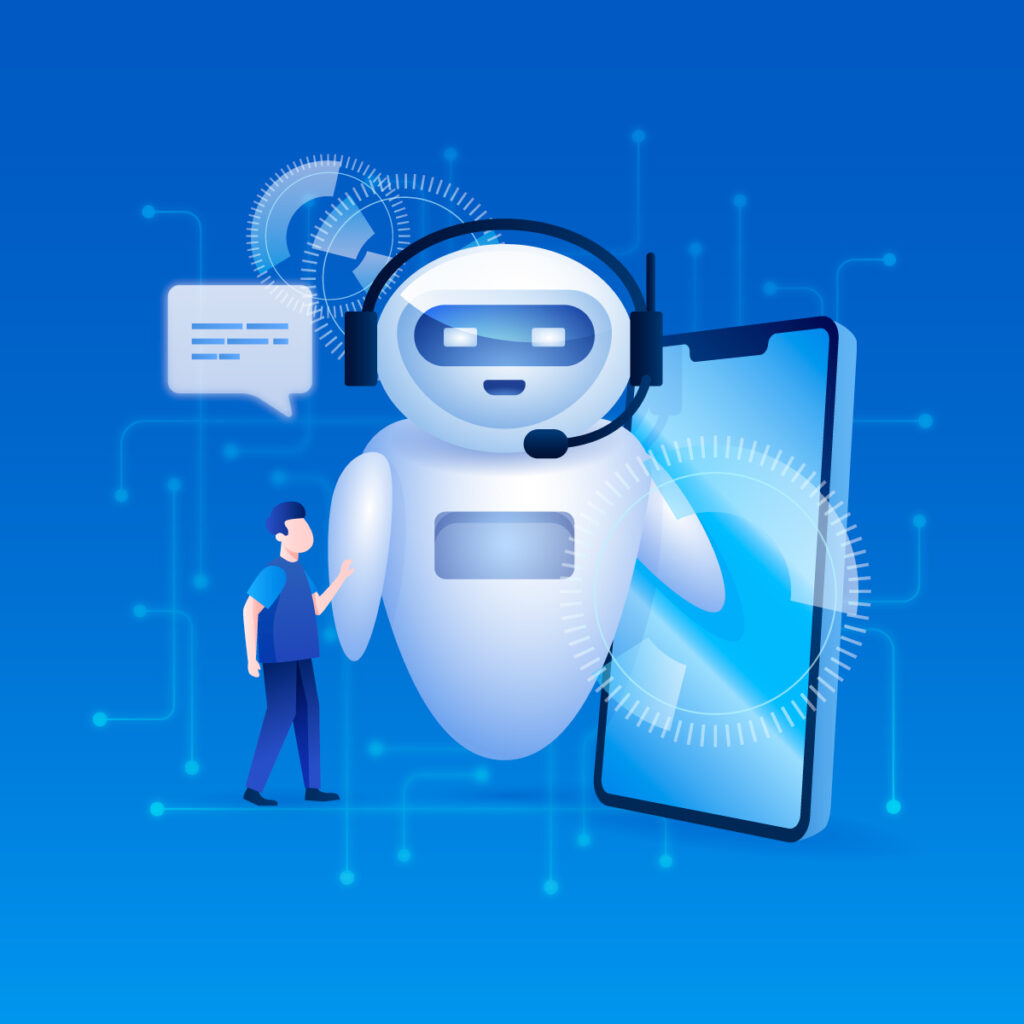
5 Service Industries That Will Be Most Affected by 2030
AI is a set of technologies used to process information or solve problems that mimic human intelligence. It includes machine learning, which allows computers to learn from experience, natural language processing (NLP), and speech recognition. These technologies are used across many industries from healthcare to fintech and logistics but they have particular relevance for the service industry, where they can be applied across multiple business areas.
Before examining how AI technologies are impacting the business world, it’s important to define the term. “Artificial intelligence” is a broad term that refers to any type of computer software that engages in human like activities including learning, planning and problem solving. Calling specific applications “artificial intelligence” is like calling a car a “vehicle” . It’s technically correct, but it doesn’t cover any of the specifics.
What is the need for AI in the service industry?
Artificial intelligence has the potential to transform the service industry. AI could create 1 trillion dollars in value for banking and insurance companies in upcoming years. The service industry is one of the largest employers worldwide, employing about one-third of all workers worldwide. In the US alone, it accounts for about 60% of GDP. Therefore, it is not surprising that AI technology has been applied to all sectors of this industry, including retail, healthcare, and financial services.
AI helps in improving customer service by identifying the most appropriate communication channel and providing optimal responses based on individual customer profiles. It can also be used to predict customer behaviour and prevent fraud more efficiently than humans can do.
AI and Business Today:
Technology allows users to ask follow-up questions and respond to complex search queries. The tool is equally effective and efficient for small- and large-scale applications. It is possible for businesses to save time, money, and resources while providing high-quality customer service but, Rather than serving as a replacement for human intelligence and ingenuity, artificial intelligence is generally seen as a supporting tool. Although AI currently has a difficult time completing common sense tasks in the real world, it is adept at processing and analysing troves of data much faster than a human brain could. Artificial intelligence software can then return with synthesised courses of action and present them to the human user. In this way, we can use AI to help game out possible consequences of each action and streamline the decision-making process.
“Artificial intelligence is kind of the second coming of software,” said Amir Husain, founder and CEO of machine-learning company SparkCognition. “It’s a form of software that makes decisions on its own, that’s able to act even in situations not foreseen by the programmers. Artificial intelligence has a wider latitude of decision-making ability as opposed to traditional software.” Those traits make AI highly valuable throughout many industries whether it’s simply helping visitors and staff make their way around a corporate campus efficiently, or performing a task as complex as monitoring a wind turbine to predict when it will need repairs.
5 Service Industries That Will Be Most Affected:

1. Information technology (IT):
IT relates to anything involving computer technology, while AI is “the ability of a computer to act like a human being.” The two have a symbiotic relationship, together driving innovation. AI combines software, hardware, and intelligence; combines neural language processing and a neural network, to perform complex tasks. IT is a part of AI that focuses on the software that conducts tasks by a computer, and needs to be pre-programmed so it doesn’t self-adapt. AI is a branch within computer science that has multiple applications: speech recognition, image processing, deep learning, machine learning, and natural language processing. AI has been shown to improve IT through process automation, quality assurance, and service management, providing additional layers of effectiveness, competitiveness, and accuracy.
2. Financial advisory services:
The financial sector can expect to encounter more AI-powered robo-advisors in the future. According to new data from Wealthramp, for example, “Millennials’ outlook on the future of financial advice is more digitally focused and purpose-driven.” Wealthramp also found that “A third of high-net-worth investors are using robo-advisors and digital apps to execute investments.” Another emerging field is bionic advisory, which combines machine calculations and human insight to enhance client relationships better than what either machine or human can provide alone.

Trading
AI and ML can also be used to make data-based decisions about investments and when to buy and sell stocks. Machines are great at predicting future behaviour of stocks because they can crunch a vast amount of data in a short time frame. This makes them extremely valuable to traders and investors. Machines can also observe patterns in past data streams and forecast how they might repeat in the future. Furthermore, by using a supercomputer and advanced mathematics, machines can track and understand market drivers, which means that humans can make more intelligent investment and trade decisions.
3. Marketing:
Tailored marketing processes
More than ever before, AI will allow marketers to reach consumers based on their interests and demographics. In addition, the technology will make it easier to put customers into distinct groups that provide for more accurate segmentation and marketing content. AI will also be better able to track the type of content consumers find interesting. This knowledge can help businesses to offer customers experiences that are highly tailored and beneficial to them, which could lead to higher conversion rates.
AI technology could also help marketers separate their customers into distinct persona groups depending on their place in the sales funnel and understand exactly what motivates them. AI also allows marketers to track which messages, such as email or text, are interacted with, deleted, or shared. It also allows for A/B testing, where, for example, emails with two different subject lines are sent out and tracked to determine which is more successful in getting the audience to open the email.
4. Healthcare:
AI is becoming increasingly capable of automating the mundane and repetitive tasks healthcare practitioners face. The technology could, for example, reduce the time it takes to analyze a bacterial swab and prescribe a suitable antibiotic. This application gives the physician more capacity to perform higher level responsibilities such as patient education and clinical assessment. An increasing number of healthcare stakeholders are also leveraging the power of AI to automate decision-making and parts of the supply chains to make financial and administrative work more efficient.AI can also take away certain human elements, such as medical errors. It’s estimated that medical errors kill 200,000 people a year, costing the world almost $2 billion over the same period.
Wellness Wearables:
Leveraging insights from AI-powered wellness wearables is already helping with disease diagnostics. Health data gathered by wearables is being used for heart disease research, heart rate data, as well as activity and sleep tracking.
The University of Michigan Health held a study with the Apple Watch to determine how well it tracks health. Lead research communicator for Michigan Medicine, Kelly Malcom, found that the study covered a diverse set of individuals, and that the data gathered from the watches were accurate, a point often in contention. “Researchers in the health and wellness space have typically relied on people to report their personal health data, like activity levels, heart rate or blood pressure, during brief snapshots in time,” Malcolm says. “Wearable health devices, such as the popular Apple Watch, have changed the game, surfacing meaningful data that can paint a more complete picture of daily life and resulting health and disease for clinicians.”
5. Transport:
Transportation is one of the main industries currently affected by AI. We’re already seeing the emergence of self-driving cars, thanks to companies like Tesla and Waymo. Even though the current models still need a driver at the wheel, completely autonomous cars are likely to be adopted as the hardware becomes more sophisticated. By 2023, it’s expected that 54 million self-driving cars will be on the road globally, up from 31 million in 2019.
Transport Services:
AI innovations in transport services will influence how we engage with transportation in several ways. In the future, consumers are likely to shift from owning personal vehicles to utilizing car services on demand, taking away the need for car ownership. In addition, AI technology could enable users to plan their trips using multiple means of transportation and manage the entire experience through their smartphones. Lower costs as a result of more efficient fleet management and the flexibility of setting up trips will make the transportation-as-a-service approach a popular choice for getting around. With ride-sharing services, customers will be able to share an autonomous car across an optimized route , allowing for cheaper, safer travel, and changing how commuters move from point A to B.
Customer Service agent work through Generative AI:

Love it or hate it, so-called generative artificial intelligence has proved its ability to make at least one type of worker more productive on the job. Using the enhanced AI boosted the productivity of customer service representatives at a Fortune 500 software firm by 14%, according to the first study to examine the emerging technology’s use by employees in a real workplace.
Notably, human support agents reported resolving more customer queries per hour when aided by a custom-built tool powered by OpenAI’s GPT technology. Assistance from the AI also improved customer sentiment, reduced the volume of requests for managerial intervention, and even improved employee retention, presumably because it allowed service agents to have more pleasant interactions with customers. Service reps interacting with customers through text chats used the custom-built AI tool to help them find answers to client questions. Specifically, the AI read interactions between customers and support agents, and generated suggested responses for the agents to use. They also had the ability to accept or reject the AI-generated text answers.
Conclusion:
While artificial intelligence is one of the most revolutionary technologies of the 21st century, its effects on existing markets are yet to be seen. We are at the beginning of the adoption curve for AI and its accompanying technologies, and the long-term benefits will soon be witnessed. However, it’s important to remember that AI isn’t intended to replace all human workers. Instead, it should be an aid, helping them work smarter and faster. As we’ve seen, there’s no shortage of ways service companies can use AI as part of their business strategy.
So adapate this business strategy with the one who are the Best in the market.
Do You Need more information?
For any further information / query regarding Technology, please email us at info@varianceinfotech.in
OR call us on +1 630 534 0223 / +91-7016851729, Alternately you can request for information by filling up Contact Us

 Please wait...
Please wait...
Leave a Reply